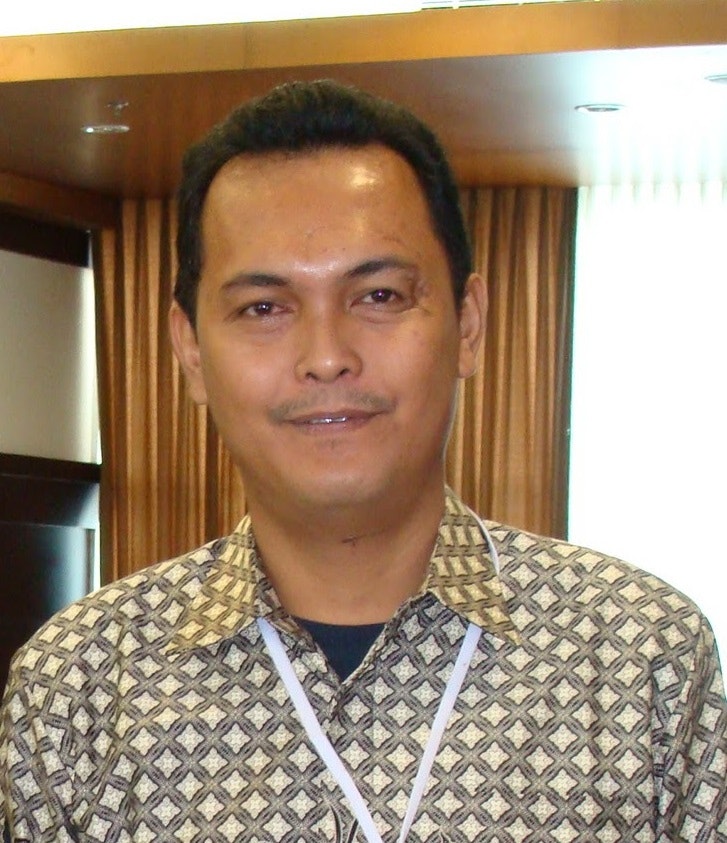Conserving Indonesia’s last freshwater dolphins: Community action for Protected Area management
Conservationist Ir Budiono is the Founder and Director of Yayasan Konservasi RASI (YK-RASI), an NGO established in 2000 to protect endangered aquatic species and their habitats in Indonesia.
The Mahakam River and its surrounding wetlands in the southeast of Indonesian Borneo are ecologically important, providing breeding grounds for migrating birds and supporting a number of endangered species. The river and its tributaries also provide habitat for two species of crocodile, smooth coated otters and 98 species of fish – a vital resource to hundreds of local fishermen who have come to rely on the Mahakam as a provider of food and income for their families.
The Mahakam River is also home to Indonesia’s last population of freshwater Irrawaddy dolphins, or pesut, as they are known locally. In recent years, numbers of Irrawaddy dolphins have fallen dramatically as overfishing, pollution and development have caused damage to the ecosystem, resulting in declining fish stocks, reducing the amount of prey available to dolphins. This loss of fish is also affecting the local communities who are finding it increasingly hard to sustain their livelihoods.
The introduction of modern fishing gear also poses a direct threat to the dolphins as drownings often occur as a result of becoming entangled in gillnets. With only 90 individuals estimated to remain, action is urgently needed to save this critically endangered population from extinction. Tackling these issues, Budi and his team are working to establish community-supported protected areas that encompass important habitat for both dolphins and their prey whilst also developing management plans built on collaboration with local stakeholders. Budi explains, “Because of the community involvement, the protected areas have a greater chance of success in comparison to nature reserves, which have been established from ‘above’ and have paid less attention to the communities’ needs.”
Through awareness raising and education, Budi is also inspiring the adoption of less harmful fishing practices, such as by encouraging the regular checking of nets, and providing training for the safe release of entangled dolphins. Sustainable aqua-culture and ecotourism initiatives, using the dolphins as a flagship species, are also providing alternative sources of income and reducing the pressure on fish stocks whilst building a local commitment to conservation.
“Because the problems faced by villagers are similar to those facing the pesut, they feel that their conservation is very important as it will also help to increase their fish resources and build a more sustainable future for all.”
PROJECT UPDATES
2020 CONTINUATION FUNDING
Project: Protecting the Mahakam dolphin, freshwater and riparian habitat in Borneo
Nature-Based Solution Award: £100,000 over 2 years
The Critically Endangered Irrawaddy dolphin is found in just three rivers: the Ayeyarwady (Myanmar), Mahakam (Indonesian Borneo) and Mekong. It has been fully protected by Indonesian law since 1990 and even adopted by Borneo’s East Kalimantan Province as their official symbol. Yet numbers are falling dramatically. Budiono’s efforts to establish a protected area finally paid off in 2020, but land along its edges is being converted into oil palm plantations with chemicals, waste and fertiliser polluting what habitat is left.
With Continuation Funding he aims to develop a long-term management plan for this mosaic of rivers, lakes, peat, riparian and swamp forests. He will secure 175,000 ha of buffer habitat as Essential Ecosystem Areas in the Kutai Kartanegara and Kutai Barat districts, as well as elevating its status from a district to national protection level.
Budiono will also work with fishers to reduce dolphin mortality rates by 50%, deploying acoustic deterrents on gillnets that prevent entanglement and drowning. Additionally, he will step up local patrols to deter illegal, unsustainable fishing activities that are further depleting food resources for both dolphins and people.
This nature-based solution will not only conserve the Irrawaddy dolphin and those fellow species relying on in-tact river ecosystems, but keep 180 million metric tonnes of carbon from emitting into the atmosphere.
2024 CONTINUATION FUNDING
Securing a future for Indonesia’s Irrawaddy Dolphin
Indonesia
£100,000 over 2 years
Flowing through Indonesia’s first freshwater National Aquatic Conservation Area, the Mahakam River is home to one of the world’s most endangered dolphin subspecies; the Irrawaddy dolphin. With a population of fewer than 50 adults, these dolphins are facing further threats from industrial expansion and habitat loss, as Indonesia’s new capital takes shape just 50km away.
Receiving his first Whitley Award in 2012, Budiono and the team at Yayasan Konservasi RASI have made critical strides in dolphin conservation, including reducing the number of dolphin deaths from fishing net entanglements by half, through the use of innovative “pinger” acoustic devices that deter dolphins from nets. In 2022, their work helped establish a 42,667-hectare freshwater protected area on the Mahakam watershed — the first of its kind in Indonesia — and secured commitments from 33 villages to protect a 186,000 hectare buffer zone around the Protected Area.
With Continuation Funding, Budiono’s project will expand protections in response to escalating development pressures. Key goals include securing stronger conservation status for 98,000 hectares of critical habitat and strengthening community-based fishing regulations to ensure dolphin-safe practices. RASI will continue collaborating with villages on anti-poaching patrols, sustainable fishing practices, and ongoing monitoring to preserve this unique river ecosystem.
This multi-faceted approach, combining technology, policy advocacy, and community partnership, aims to further reduce dolphin mortality and establish a lasting conservation framework to protect the Mahakam River’s biodiversity for generations to come.








